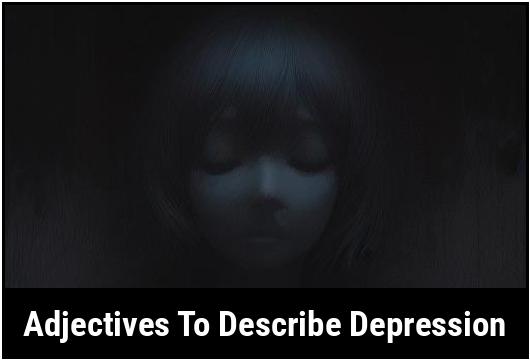- You are here:
- Home »
- adjectives
- » 31 Adjectives To Describe Depression

31 Adjectives To Describe Depression
Depression, a complex and multifaceted mental health condition, can be difficult to articulate and understand, both for those experiencing it and for those trying to comprehend it. Describing the profound and intricate emotions associated with depression can be challenging, and finding the right words to convey its impact is crucial for effective communication and empathy. One way to capture the intricacies of depression is through the use of adjectives. Adjectives offer a nuanced and detailed approach to express the myriad feelings and experiences of depression. In this comprehensive guide, we will delve into the world of adjectives to describe depression, exploring their significance, application, and various types.
Key Takeaways
- Depression is a complex mental health condition characterized by persistent feelings of sadness, hopelessness, and disinterest.
- Adjectives play a crucial role in depicting the nuanced and multifaceted experiences associated with depression.
- Choosing the right adjectives is essential for accurately expressing the emotions and impact of depression.
- Different types of adjectives, such as emotional, physical, and cognitive, can be employed to effectively describe depression.
Adjectives To Describe Depression
1. Overwhelming
Depression can be overwhelming, as individuals may feel an intense sense of hopelessness and despair that makes even the simplest tasks challenging.
2. Exhausting
One adjective that resonates with many people who experience depression is exhausting. Depression can drain an individual’s energy, leaving them feeling physically and emotionally depleted.
3. Isolating
Depression often leads to isolation, as those affected may feel disconnected from friends, family, and the world around them. The desire for solitude can be overwhelming during depressive episodes.
4. Numb
Depression can make individuals feel emotionally numb, as if they have lost their ability to experience joy or pleasure. Everything may seem gray and devoid of meaning.
5. Desperate
Feelings of desperation can envelop those experiencing depression, as they search for relief from the relentless despair that seems to consume their lives.
6. Heavy
People with depression often describe the weight they carry, both figuratively and physically. It is as if an invisible burden is constantly pressing down on them, making every step feel arduous.
7. Unpredictable
Depression is unpredictable, manifesting in a multitude of ways and varying in intensity from day to day. This unpredictability can make it difficult for individuals to plan or envision a future beyond their current struggles.
8. Suffocating
Describing depression as suffocating captures the feeling of being smothered by a relentless darkness that makes it difficult to breathe and find relief.
9. Paralyzing
Depression can be paralyzing, rendering individuals unable to take action or make decisions. It can feel as if life is on hold while depression takes control.
10. Loneliness
A profound sense of loneliness often accompanies depression, even when surrounded by others. This emotional distance makes it challenging to find solace and support.
11. Persistent
Depression can persist, sometimes for extended periods of time. The ongoing nature of the condition can be demoralizing, as individuals struggle to find respite from their emotional pain.
12. Agonizing
The emotional pain experienced during bouts of depression can be agonizing. It can feel as if one’s soul is being torn apart, leaving individuals desperate for relief.
13. Chaotic
Depression can cause the mind to feel chaotic and cluttered, making it challenging to focus, think clearly, or engage in daily activities. This internal chaos adds an extra layer of distress to the condition.
14. Consuming
Depression can consume a person’s thoughts, emotions, and attention, leaving little room for anything else. The condition can become all-encompassing, making it difficult to find reprieve.
15. Looming
Depression can feel like a looming presence that is always present, waiting to engulf individuals in its darkness. This looming sense can exacerbate feelings of fear and uncertainty.
16. Inescapable
Depression is often described as inescapable, as it follows individuals even in moments of distraction or temporary respite. It can feel as if a cloud is constantly hanging over their heads.
17. Debilitating
Depression can be debilitating, robbing individuals of their ability to engage in everyday tasks or pursue their passions. Even the simplest activities may become insurmountable challenges.
18. Alienating
Depression can alienate individuals from their loved ones, creating a wedge between them and their support systems. It can be difficult for those without personal experience to understand the depths of depression.
19. Hollow
People experiencing depression may describe feeling hollow or empty, as if something vital is missing from their lives. The absence of joy and fulfillment can amplify this sense of emptiness.
20. Fragile
Depression can make individuals feel emotionally fragile, as if they might shatter at the slightest disturbance. It can leave them feeling vulnerable and easily overwhelmed.
21. Constricting
Depression can constrict an individual’s world, limiting their options and outlook on life. The walls can feel like they are closing in, restricting their ability to envision a future beyond their current struggles.
22. Unrelenting
Depression can be unrelenting, as individuals may find temporary relief challenging to attain. This relentlessness can make each day feel like a battle against an invisible force.
23. Disorienting
Depression can be disorienting, causing individuals to lose their sense of self or direction. It can leave them feeling disconnected from their own beliefs, values, and aspirations.
24. Drowning
A common image used to describe depression is drowning. Individuals may feel submerged under a wave of sadness and despair, struggling to breathe and stay afloat.
25. Shrinking
Depression can make individuals feel as if they are shrinking, not just emotionally but also in terms of the impact they have on the world. It can diminish their sense of self-worth and purpose.
26. Unseen
Depression is often referred to as an invisible illness because its effects are not always outwardly apparent. Others may be unaware of the internal turmoil individuals are experiencing.
27. Discouraging
Depression can be discouraging, as individuals may lose hope in their ability to overcome their condition. Each setback can feel like a confirmation that things will never get better.
28. Stifling
Depression can stifle creativity, passion, and enthusiasm. It can make it challenging for individuals to access their full potential or find joy in activities they once loved.
29. Unforgiving
Depression can be unforgiving, showing no mercy even during times when life seems to be going well. It can strike unexpectedly, reminding individuals of its ever-presence.
30. Fragmented
Depression can leave individuals feeling fragmented, as if their identity is shattered into pieces. It can be difficult to reconcile their true selves with the person they have become while struggling with the condition.
31. Transformative
While depression is undoubtedly a difficult and painful experience, it can also be transformative. Through introspection and therapeutic interventions, individuals can learn, grow, and develop resilience in the face of their struggles.
Why Use Adjectives To Describe Depression
Adjectives are indispensable tools for articulating the myriad emotions, experiences, and effects that accompany depression. Unlike nouns and verbs, which may convey general concepts or actions, adjectives provide the color, depth, and texture needed to encapsulate the diverse and often contradictory facets of the condition.
By deploying adjectives, it becomes possible to communicate the depth of despair, the weight of apathy, and the suffocating nature of numbness that permeate the experience of depression. Furthermore, adjectives allow for a more personalized and specific description, enabling individuals to convey their unique encounters with depression and facilitating empathy and understanding from others.
In addition, adjectives have the power to humanize the experience of depression, transcending clinical jargon and statistics by offering a vivid and relatable portrayal of the condition. By breathing life into the language used to describe depression, adjectives foster connection, empathy, and recognition of the profound impact it has on individuals.
How To Choose The Right Adjective To Describe Depression
Selecting the most apt adjectives to describe depression involves a thoughtful and introspective process. It requires a deep understanding of one’s own emotions and experiences, as well as an appreciation of the myriad ways in which depression can manifest. Here are some considerations for choosing the right adjectives to convey the experience of depression:
-
Self-Reflection: Take the time to reflect on the specific emotions and sensations that accompany your experience of depression. Consider the nuances of your feelings, the ways in which depression manifests in your thoughts, behaviors, and physical sensations, and the impact it has on your overall well-being.
-
Consultation: Engage in conversations with mental health professionals, trusted individuals, or support groups to gain insight into the diverse manifestations of depression. Listening to others’ experiences can broaden your understanding and vocabulary for expressing the condition.
-
Emotional Resonance: Choose adjectives that resonate with the depth and complexity of your emotions. Look for words that capture the essence of your experience, whether it be a profound sense of anguish, a pervasive feeling of emptiness, or a profound longing for respite.
-
Avoiding Stigmatizing Language: Be mindful of the language you use to describe depression. Opt for adjectives that do not contribute to stigmatization or trivialization of the condition, as these can perpetuate misunderstanding and hinder empathy and support.
Types Of Adjectives For Describing Depression
Adjectives used to describe depression can encompass a wide spectrum of emotions, physical sensations, and cognitive experiences. These types of adjectives offer a comprehensive framework for articulating the multifaceted nature of depression. Here are some key types of adjectives for describing depression:
Emotional Adjectives
Emotional adjectives form the core of describing depression, as they capture the profound and pervasive feelings that define the condition. These adjectives convey the depth of despair, the weight of sorrow, and the enduring nature of emotional pain. Examples of emotional adjectives to describe depression include:
- Desolate
- Tormented
- Numb
- Agonizing
- Overwhelmed
Physical Adjectives
Physical adjectives are instrumental in communicating the somatic and bodily manifestations of depression. These adjectives depict the physical toll that depression can exact, including fatigue, lethargy, and bodily aches. Physical adjectives for describing depression may include:
- Drained
- Exhausted
- Achy
- Listless
- Tense
Cognitive Adjectives
Cognitive adjectives offer a glimpse into the mental landscape of depression, encompassing the cognitive distortions, rumination, and cognitive fatigue that often accompany the condition. These adjectives shed light on the impact of depression on one’s thoughts, cognition, and perception. Examples of cognitive adjectives to describe depression are:
- Foggy
- Self-critical
- Distracted
- Detached
- Hopeless
Behavioral Adjectives
Behavioral adjectives elucidate the impact of depression on one’s actions, behaviors, and daily functioning. These adjectives convey the withdrawal, disengagement, and disrupted routines that are characteristic of depression. Examples of behavioral adjectives to describe depression include:
- Withdrawn
- Apathetic
- Isolated
- Inhibited
- Unmotivated
Environmental Adjectives
Environmental adjectives encompass the broader impact of depression on one’s surroundings, encompassing the ways in which depression affects one’s environment, social interactions, and daily surroundings. These adjectives capture the disruption, desolation, and alienation that can extend beyond the individual experiencing depression. Examples of environmental adjectives for describing depression are:
- Dismal
- Alienating
- Disconnected
- Dreary
- Harsh
Depression, with its intricate tapestry of emotions, sensations, and effects, demands a nuanced and comprehensive vocabulary for effective expression. Adjectives serve as invaluable tools for articulating the depth, complexity, and impact of depression, offering a window into the multifaceted experience of the condition. By selecting the right adjectives, individuals can convey the profound emotional, cognitive, physical, and behavioral dimensions of depression, fostering empathy, understanding, and authentic communication. Embracing the diverse types of adjectives, from emotional and physical to cognitive and environmental, allows for a rich and nuanced portrayal of the experience of depression, shedding light on its multidimensional nature and promoting a deeper appreciation of its effects.
Examples Of Adjectives For Different Types Of Depression
Depression is a complex mental health condition that affects millions of people around the world. It manifests in various ways and can have a significant impact on a person’s daily life. One way to better understand and describe this condition is through the use of adjectives. Adjectives are words that describe or modify nouns and can be immensely helpful in expressing the different facets and experiences of depression.
Depression can present itself in different forms, each with its own unique characteristics and symptoms. Here are some examples of adjectives that can be used to describe different types of depression:
-
Major Depression (also known as Clinical Depression):
- Overwhelming: Describes how the feelings of sadness and hopelessness can become overpowering and all-encompassing.
- Debilitating: Describes how depression can have a severe impact on one’s ability to function and carry out daily activities.
- Inescapable: Highlights the feeling of being trapped in a state of sadness from which it seems impossible to escape.
- Persistent: Suggests that the symptoms of depression persist for an extended period, often lasting for weeks, months, or even years.
- Deep: Reflects the profound emotional depth and intensity that characterizes this type of depression.
-
Dysthymia (Persistent Depressive Disorder):
- Chronic: Implies that the symptoms of depression persist for a long time, typically lasting for at least two years.
- Mild: Refers to the intensity of the depressive symptoms, which may be less severe than major depression but still have a significant impact on everyday life.
- Lingering: Conveys the sense that the symptoms of dysthymia tend to hang around or persist even during periods of relative stability.
- Subtle: Describes how the symptoms of dysthymia can be more insidious and less noticeable than those of major depression.
-
Bipolar Disorder (Manic Depression):
- Cyclical: Conveys the cyclic nature of bipolar disorder, with episodes of mania followed by episodes of depression.
- Extreme: Highlights the contrasting emotional states experienced in bipolar disorder, from the highs of mania to the lows of depression.
- Unpredictable: Emphasizes the variability and unpredictability in mood swings experienced by individuals with bipolar disorder.
- Rapid: Describes the speed at which mood swings can occur, with shifts from mania to depression happening relatively quickly.
- Chaotic: Reflects the tumultuous and often disruptive changes in mood and behavior seen in bipolar disorder.
-
Seasonal Affective Disorder (SAD):
- Seasonal: Signifies that the symptoms of depression occur during specific seasons, especially the winter months when there is less daylight.
- Lethargic: Refers to the lack of energy, motivation, and general feelings of fatigue commonly associated with SAD.
- Hibernating: Highlights the tendency to withdraw and isolate oneself during the depressive episodes caused by SAD.
- Weather-driven: Suggests that changes in weather and daylight hours have a significant impact on mood and emotional well-being.
- Melancholic: Conveys a sense of sadness and gloom often experienced by individuals with SAD during the colder and darker months.
-
Postpartum Depression:
- Pervasive: Describes how the symptoms of depression can permeate every aspect of a new mother’s life during the postpartum period.
- Isolating: Highlights the tendency to withdraw from social interactions and feel disconnected from others.
- Overwhelming: Conveys the sense of being inundated and overwhelmed by the challenges of motherhood combined with the symptoms of depression.
- Guilt-ridden: Suggests the common experience of feeling guilty or inadequate as a mother due to the inability to fully enjoy or bond with the newborn.
- Hormone-related: Recognizes the connection between hormonal changes during and after pregnancy and the onset of depressive symptoms.
These are just a few examples of adjectives that can be used to describe different types of depression. It is important to note that depression is a nuanced and multifaceted condition, and individuals may experience a combination of these different types or variations within them.
Common Mistakes In Using Adjectives To Describe Depression
While adjectives can be a valuable tool in describing depression, it is crucial to avoid common mistakes that can lead to misunderstanding or perpetuate stigma. Here are some common mistakes to avoid when using adjectives to describe depression:
-
Overgeneralizing: It is important to remember that depression is not a one-size-fits-all experience. Avoid using adjectives that suggest that everyone with depression feels the same way or has identical symptoms. Different individuals may experience depression in unique ways, and their experiences should be acknowledged and respected.
-
Stigmatizing: Be mindful of the language used when describing depression. Avoid adjectives that perpetuate stereotypes or misconceptions about mental health. Instead, focus on using compassionate and understanding language that promotes empathy and support.
-
Minimizing: Depression is a serious condition that can have a profound impact on an individual’s life. Avoid using adjectives that downplay or trivialize the experiences of those with depression. Using dismissive or minimizing language can invalidate their feelings and discourage them from seeking help.
-
Romanticizing: Depression is not a romantic or desirable state of being. Avoid using adjectives that romanticize or glorify depression, as this can perpetuate harmful misconceptions and trivialize the real struggles faced by those with the condition.
It is important to approach discussions about depression with sensitivity and empathy, using adjectives that accurately reflect the experiences of individuals while avoiding stereotypes, stigma, and minimizing language.
Using Adjectives Effectively
To use adjectives effectively when describing depression, consider the following tips:
-
Contextualize the Adjectives: Provide context when using adjectives to describe depression. Explain how they relate to the experiences and symptoms of the condition. This will help others gain a better understanding of what is being conveyed.
-
Be Empathetic: Approach the use of adjectives with empathy and understanding. Acknowledge the profound impact depression can have on individuals’ lives and use language that demonstrates compassion rather than judgment or belittlement.
-
Use Descriptive Language: Use adjectives that vividly describe the experiences and emotions associated with depression. This will help paint a more detailed and accurate picture of how it feels to navigate through this condition.
-
Consider Individual Differences: Recognize that depression manifests differently in each individual. Be open to the unique experiences and symptoms that people may have and avoid making assumptions based on stereotypes or generalizations.
-
Promote Understanding and Awareness: Use adjectives that promote understanding and awareness about depression. Choose words that encapsulate the complexity of the condition and challenge misconceptions. Through thoughtful language, we can contribute to greater understanding and reduce the stigma surrounding mental health.
Exercises And Practice
To practice using adjectives effectively when describing depression, try the following exercises:
Exercise 1: Descriptive Writing
Write a short descriptive paragraph about depression using a combination of the adjectives mentioned earlier. Be as detailed and vivid as possible to convey a comprehensive understanding of the condition. Focus on capturing the experiences, emotions, and impact of depression on individuals’ lives.
Exercise 2: Sensitivity Check
Review a piece of writing or conversation about depression that you have come across. Analyze the adjectives used and assess whether they promote empathy, understanding, and accuracy. Identify any adjectives that may perpetuate stigma, stereotypes, or minimize the experiences of individuals with depression. Then, suggest alternative adjectives that better capture the nuances of the condition.
Exercise 3: Reflection and Self-awareness
Reflect on your own use of adjectives when discussing or describing depression. Assess whether they accurately reflect the experiences and emotions associated with the condition. Consider how your language may impact others and whether any changes might be needed to create a more compassionate and supportive dialogue.
Conclusion
Adjectives are powerful tools that can enhance our ability to describe and understand depression. By using descriptive, empathetic, and accurate language, we can create a more comprehensive portrayal of the experiences faced by individuals with depression. However, it is important to use adjectives responsibly, avoiding generalizations, stigma, and minimizing language. By practicing the exercises provided and being mindful of our words, we can contribute to a more compassionate and informed conversation surrounding mental health.
FAQS On Adjectives To Describe Depression
What Are Some Common Adjectives Used To Describe Depression?
Some common adjectives that are used to describe depression include overwhelming, debilitating, severe, persistent, and all-encompassing.
Can You Provide More Specific Adjectives To Describe The Symptoms Of Depression?
Yes, some additional adjectives that are frequently used to describe the symptoms of depression include sadness, hopelessness, helplessness, despair, and numbness.
How Do Adjectives Help In Understanding Depression?
Adjectives are powerful tools in describing and articulating the experience of depression. They provide a more nuanced and detailed explanation of the condition, helping individuals to better understand and identify their own feelings and experiences.
Are There Different Adjectives To Describe Various Types Of Depression?
Yes, there are different adjectives used to describe different types of depression, such as mild, moderate, and severe depression. Other adjective pairs include chronic and acute, or situational and clinical.
Can Adjectives Be Used In A Positive Way To Describe Depression?
While depression is often described in negative terms, there are also some positive adjectives that can be used to describe the experience, such as transformative, introspective, and resilient. These terms highlight the potential for growth and personal development that can come from navigating and overcoming depression.








